News of the Week
Page 28
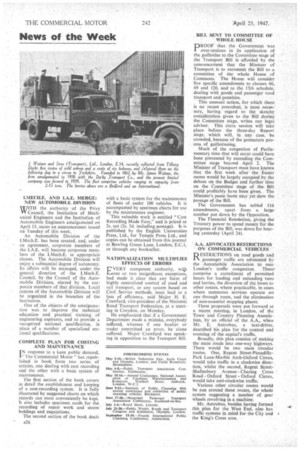
Page 29
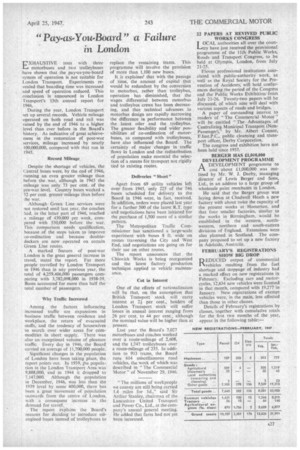
Page 30
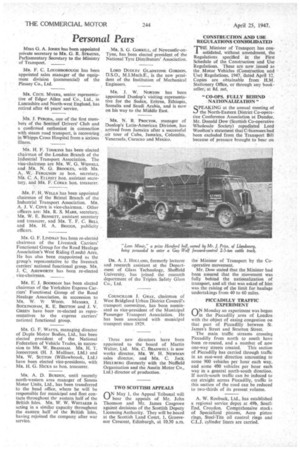
Page 31

Page 32
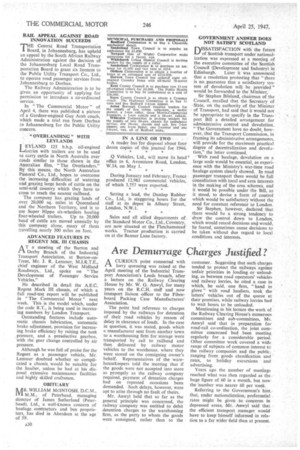
Page 33
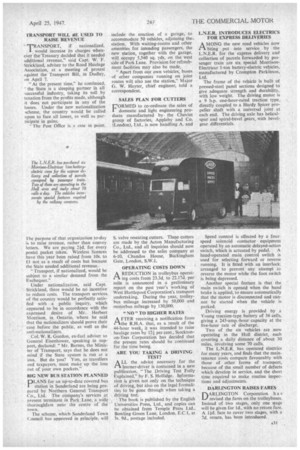
If you've noticed an error in this article please click here to report it so we can fix it.
LMECH.E. AND I.A.E. MERGE: NEW AUTOMOBILE DIVISION WITH the authority .of the Privy IN Council, the Institution of Mechanical Engineers and the Institution of Automobile Engineers amalgamated on April 13, states an announcement issued on Tuesday of this week. • An Automobile Division of the I.Mech.E. has been created, and, under an agreement, corporate members of the I.A.E. will become corporate members of the LIVIech.E. in appropriate classes. The Automobile Division will enjoy a substantial degree of autonomy. Its affairs will be managed, under the • general direction of the I.Mech.E. Council, by the Council of the Automobile Division, elected by the corporate members of that division. Local centres of the Automobile Division will be organized in the branches of the Institution.
• One of the objects of the amalgamation was to improve the technical education and practical training of engineering aspirants, and to provide a recognized national qualification, in place of a number of specialized sectional qualifications.
COMPLETE PLAN FOR COSTING AND MAINTENANCE I N response to a keen public demand, "The Commercial Motor has republished in book form two series of articles, one dealing with cost recording and the other with a basic system of maintenance.
The first section of the book covers in detail the establishment and keeping of a cost-recording system. It is fully illustrated by suggested charts on which records can most conveniently be kept. It also includes specimen cards for the recording of repair work and stores' holdings and requisitions.
The second section of the book deals with a basic system for the maintenance of fleets of under 100 vehicles. it is accompanied by specimen charts for use by the maintenance engineer.
This valuable work is entitled "Cost Recording Made Easy," and is priced at 2s. net (2s. 3d. including postage). It is published by the English Universities Press, Ltd., for Temple Press Ltd., and copies can be obtained from this journal at Bowling Green Lane, London, E.C.I, or through any bookseller.
NATIONALIZATION MULTIPLIES EFFECTS OF ERRORS
EVERY competent authority, wkli one or two insignificant exceptions, had made it clear that any form of highly centralized control of road and rail transport, or any system based on Civil Service methods, must lead to a loss of efficiency, said Major H. E. Crawfurd, vice-president of the National Road Transport Federation, at a meeting in Croydon, on Monday.
He emphasized. that if a Government Department made a mistake, everybody suffered, whereas if one haulier or trader committed an error, he alone suffered. Major Crawford was speaking in opposition to the Transport Bill. , BILL SENT TO COMMITTEE OF WHOLE HOUSE
PROOF that the Government was over-zealous in its application of the guillotine to the Committee stage of the Transport Bill is afforded by the announcement that the Minister of Transport is to recommit the Bill to a committee of the whole House of Commons. The House will consider five specific amendments to clauses 46. 69 and 120, and to the 15th schedule, dealing with goods and passenger road transport and penalties.
This unusual action, for which there is no recent precedent, is most necessary, having regard to the sketchy consideration given to the Bill during the Committee stage, writes our legal adviser. This extra session will take place before the three-day Report stage, which will, in any case, be crowded, because of the premature process of guillotineing.
Much of the congestion of Parliamentary time that will occur could have been prevented by extending the Committee stage beyond April 2. The Minister of Transport must have known that the first week after the Easter recess would be largely occupied.by the debate on the Budget and further time on the Committee stage of the Bill could profitably have been given. The Minister's panic haste may yet slow the passage of the Bill.
The Government has tabled 116 amendments, apart from a large number put down by the Opposition.
The Financial Resolution, giving the Treasury power to spend money for the purposes of the Bill, was down for hearing yesterday (April 24).
A.A. ADVOCATES RESTRICTIONS ON COMMERCIAL VEHICLES DESTRICTIONS on road goods and IA passenger traffic are advocated by the Automobile Association to ease London's traffic congestion. Thesecomprise a curtailment of permitted hours for loading and unloading vans and lorries, the diversion of the buses to other routes, where practicable, in cases where numerous services operate on one through route, and the elimination of non-essential stopping places.
These proposals were put forward at a recent meeting, in London, of the Town and Country Planning Association, by an official of the A.A., when Mr. E. Antrobus, a taxi-driver, described his plan for the control and routeing of the capital's traffic.
Broadly, this plan consists of making the main roads into one-way highways. There would be two main circular routes. One, Regent Street-PiccadillyPark Lane-Marble Arch-Oxford Circus, would take traffic in a clockwise direction, whilst the second, Regent StreetShaftesbury Avenue Charing Cross Road Oxford Street Oxford Circus, would take anti-clockwise traffic.
Various other circular routes would be run around these routes, the whole system suggesting a number of gear wheels revolving in a machine.
Mr. Antrobus, besides having formed this plan for the West End, also has traffic systems in mind for the City and • the King's Cross area. 22 PAPERS AT REVIVED PUBLIC WORKS CONGRESS
LOCAL authorities all over the coun1-4try have just received the provisional programme of the 1 1 th Public Works, Roads and Transport Congress, to be held at Olympia, London, from July 21-25.
Eleven professional institutions associated with public-authority work, as well' as the Royal Society for the Prevention of Accidents, will hold conferences during the period of the Congress and the Public Works Exhibition' from July 21-26. Twenty-two papers will be discussed, of which nine will deal with various aspects of roads and bridges. A paper of outstanding interest to readers of "The Commerc;a1 Motor " will be entitled "The Advantages of Centralizing Municipal Transport (NonPassenger)," by Mr. Albert Connor, F.Inst.P.C., public cleansing and transport officer, Derby Corporation. The congress and exhibition have not been held since 1937.
BERGER HAS £1,0110,000 DEVELOPMENT PROGRAMME
ADEVELOPMENT programme to cost about £1,000,000 was outlined by Mr. W. J. Darby, managing director of Lewis Berger and Sons, Ltd., in an address to a large group of wholesale paint merchants in London.
He said that the Berger group was laying down at Chadwell Heath a new factory with about twice the capacity of the present works at Homerton, and that four smaller factories, similar to the works in Birmingham, would be established in the western, northwestern, northern and south-eastern divisions of England. Extensions were also planned in Scotland. The company proposed to set up a new factory in Adelaide, Australia.
FEBRUARY'S REGISTRATIONS SHOW BIG DROP
REDUCED output of commercial vehicles resulting from the fuel shortage and stoppage of industry had a marked effect on new registrations in February. Excluding cars and motorcycles, 12,634 new vehicles were licensed in that month, compared with 19,277 in January. New registrations of exempt vehicles were, in the main, less affected than those in other classes.
Details of February's registrations by classes, together with cumulative totals for the first two months of the year, appear in the following table:—
CONSTRUCTION AND USE REGULATIONS CONSOLIDATED
THE Minister of Transport has con I solidated, without amendment, the Regulations specified in the First Schedule of the Construction and Use Regulations. These are now issued as the Motor Vehicles (Construction and Use) Regulations, 1947, dated April 12. Copies are obtainable from H.M. Stationery Office, or through any bookseller; at Scl. net.
"CO-OPS. FULLY BEHIND NATIONALIZATION"
SPEAK.ING at the annual meeting of the North-Eastern District Co-operative Conference Association at Dundee, Mr. Donald Dow (Scottish Co-operative Wholesale Society) repudiated Lord Woolton's statement that C-licensees had been excluded from the Transport Bill because of pressure brought to bear on
the Minister of Transport by the Cooperative movement.
Mr. Dow stated that the. Minister had been assured that the movement was fully behind the nationalization of transport, and all that was asked of him was the raising of the limit for haulage undertakings from 40 to 60 miles.
PICCADILLY TRAFFIC EXPERIMENT
ON Monday an experiment was begun in the Piccadilly area of London with the object of easing congestion on that part of Piccadilly between St. James's Street and Stratton Street.
The main traffic streams crossing Piccadilly from north to south have been re-routed, and a number of new one-way streets created. This section of Piccadilly has carried through traffic in an east-west direction amounting to some 900 vehicles per hour each way, and some 400 vehicles per hour each way in a general north-south direction. If north-south traffic can be induced to cut straight across Piccadilly, traffic in this section of the road can be reduced to two-thirds of its present volume.
A. W. Roebuck, Ltd., has established a regional service depot at 49b, South End, Croydon. Comprehensive stocks of Specialloid pistons, Aero piston rings, Steel-Tite oil control rings and C.L.J. cylinder liners are carried. • EXPORT POLICY KILLING BRITISH TRADE CHANCES
NAALTA; Cyprus, Palestine and Egyp,t JVI are importing large quantities of consumer goods from the United States, although Britain was capable of supplying those markets, said Mr, P. G. Donald, chairman of the import and export merchants' section of London Chamber of Commerce, last Friday. \Ir. Donald recently completed a 25,000mile tour of Canada, the U.S.A., Malta, Cyprus, Egypt, Palestine, Sudan, East Africa, Rhodesia and South Africa.
American goods arriving in South Africa were in many cases, finding their way to Rhodesia.
"In 1946 this country exported E1,250,000 of raw-material iron and steel at under £25 per ton," added Mr. Donald. " Had we used it to make and export finished supplies, we should have brought in from £75 to £400 per ton. A similar large-scale export of raw aluminium also took place. Not only is the British producer starved of these raw materials, but the British export position is made more difficult because they have gone to create competition."
Mr. Donald also explained that British East Africa would be able to grow linseed and food products if it were able :o obtain tractors. Kenya had failed to import tractors from Britain and was now trying to buy them from America.
Advising a guarded acceptance of Board of Trade accounts, Mr. Donald :ommented: "When a tourist is supplied with £75 to enjoy a holiday abroad, exports have to he made to redeem the sterling. The total of this type of trade liability, understood to be some millions a year, does not appear in our trade returns."
HAULIERS OBJECT TO POOLING
A T a sitting of the Scottish Deputy Licensing Authority in Glasgow on April 17, Mr. J. Law, a solicitor, protested against the continuance of wartime pooling arrangements for the distribution of confectionery and biscuits. He was representing Glasgow and district haulage contractors in objecting to i he granting of five B licences to Messrs. Adam Steedroart, wholesale. confectioners, of Glasgow.
They stated that they at present held C licences for five vans for the carriage of their own goods. They desired B licences to enable them to carry goods for other firms in the same line of business.
In granting •the application, Mr. J. Robertson said he thought that the handling of sweets, chocolate and biscuits was a different matter from the carriage of other goods. He thought that if firms desired to continue pooling arrangements, it was an indication that they had found the war-time method of working satisfactory.
TWENTY-FIVE YEARS WITH ONE HAULAGE COMPANY
T°th'rk 23 years' service with Mack's Ratifiers, Ltd., Mr. E. Brown, works manager; received presentations at a dance given by the company last Satur
day. drifts fioin, Mr. A. G. Mack, nianaging• director, an.d frOrn the staff were handed over by Mr, M. E. Mack, a director.. Mr. A. G. Magic Was unable to be present because of serious illness. Since the company's operations were described in "The Commercial Motor" in 1935, the fleet has grown from 186 vehicles to some 230, including 50 tankers. The company is one of the biggest operators of tankers in London.
MR. J. F. E. PYE CHAIRMAN OF SEVEN COMPANIES L'ORMED 25 years ago by Mt. Henry Pye with an ex-Service A.E.C. 4-tonner, the Pye organization has expanded until it now comprises seven companies, of which Mr. J. F. E. Pye is chairman and managing director. These C o n cerns operate under the wing of Britannic Transport Holdings, Ltd.. of which Mr. J. F. E. Pye is also managing director.
The story pf H. q'ye and Son, Ltd., is told in a new publication issued to mark the company's jubilee. During the war the concern provided men and vehicles to form the nucleus of an R.A.S.C. Reserve Transport Company, which became 2051 Company of the newly raised No. 2 London Transport Column. Mr. Pye was gazetted Major commanding 2051 Company, with Mr. R. T. Smith, controlling engineer of H. Pye and Son, Ltd., as Captain and second-in-command, Major Pye later became Column Commander, with the rank of Lieut.-Colonel, and Capt. Smith was promoted Major commanding 2051 Company.
BODY EXECUTIVE AVAILABLE
AMAN with extensive experience in selling, buying, costing and building passenger and goods-carrying bodies over a period of many years requires a suitable position, preferably in the Home or Eastern Counties. Letters should be addressed "Bodywork," care of the Editor,
STEALING BY FINDING, OR HIGHWAY ROBBERY?
SPEAKING at the annual dinner of the South Wales Area of the: senger Vehicle Operators' Association, Col. R. G. Llewellyn, C.B.E., High Sheriff of Glamorgan, said that if the nationalization of the passenger transport industry were not stealing by finding, then it was highway robbery.
The pioneers of the passenger-transport industry had taken the risks and created one of the finest organizations
in the country, and he was confident that if the masses of the people knew what nationalization of passenger transport meant, they would rise in a body. Fares were bound to go up.
Among those present were Mr. F. J. Speight (national chairman of the P.V.O.A.), Mr. Edward Pinto (chairman of the P.V.O.A. hire-car and taxicab section), and Mr. F. A. Walker (national secretary). Mr. E. V. Ralph presided.
44-HOUR WEEK COSTS DUNDEE 127,000 I N a report to Dundee Transport Com mittee, Mr. Robert' Taylor, general manager, stated that the introduction of the 44-hour week would cost his department £27,000 per year, and 73 employees' would have to be added to the pay-roll.
The convener, Mr. W Lumsden, foreshadowed an met-ease in fares to meet the higher expenditure.
RAIL APPEAL AGAINST ROAD INNOVATION SUCCEEDS
'THE Central Road Transportation I Board, in Johannesburg, has upheld an appeal by the South African Railway Administration against the decision of the Johannesburg Local Road Transportation Board to grant six licences to the Public Utility Transport Co., Ltd.,
• to operate road passenger services from • Johannesburg to Durban.
The Railway Administration is to be given an opportunity of applying for permission to introduce a co-ordinated service.
In "The Commercial Motor" of April 4, there was published a picture of a Gardner-engined Guy Arab coach, which made a trial run from Durban to Johannesburg for the Public Utility concern.
OVERLANDING " WITH LEYLANDS
LEYLAND 125 b.h.p. oil-engined lorries with trailers are to be used to carry cattle in North Australia over roads similar to those shown in the Australian film, "The Overlanders.” By this means, the North Australian Pastoral Co., Ltd., hopes to overcome the increasing difficulties of watering and grazing large herds of cattle on the semi-arid country which they have to cross to reach the nearest railhead.
The company has grazing lands of over 20,000 sq. miles in Queensland and the Northern Territory, and is to use Super Hippo six-wheelers hauling four-wheeled trailers. Up to 20,000 head of cattle are moved annually by this company alone, many of them travelling nearly 300 miles on foot.
ADVANCED FEATURES IN REGENT MK. III CHASSIS
AT a meeting of the Burton and Derby Branch of the Industrial Transport Association, at Burton-onTrent, Mr. J. R. Lemmer, M.I.R.T.E., chief engineer of the West Midland Roadways,. Ltd., spoke on "The Development of Passenger Service Vehicles."
He described in detail the A.E.C. Regent Mark HI chassis, of which a full road-test report will be published in "The Commercial Motor" next week. This is the model which, under the code R.T., is being used in increasing numbers by London Transport.
• Outstanding features include automatic chassis lubrication, automatic brake adjustment, provision for increasing brake efficiency by raising the tank . pressure, and •a preselective gearbox, with the gear change controlled by air pressure.
Although he was full of praise for the Regent as a passenger vehicle, Mr. Lemmer doubted whether so complicated a chassis, would be suitable for the haulier, unless he had at his disposal extensive maintenance facilities and highly skilled craftsmen.
_OBITUARY
TtITR. WILLIAM McINTOSH, D.C.M., IVLMM., of Peterhead, managing director of James Sutherland (Peterhead). Ltd., a well-known concern of haulage contractors and bus proprietors, has died in Aberdeen at the age • of 59.
IN A LINE OR TWO A reader has for disposal about four dozen copies of this journal for 1946.
Q Vehicles, Ltd., will move its head office to 6, Avonmore Road, London, W.14, on May 1.
During January and February, France produced 12,981 commercial vehicles, of which 3,757 were exported.
Setting a lead, the Dunlop Rubber Co., Ltd., is staggering hours for the staff at its depot in Albany Street, London, N.W.1.
Sales and all allied departments of the Standard Motor Co., Ltd., Coventry, are now situated at the Fletchamstead works. Tractor production is carried on at the Banner Lane factory. GOVERNMENT ANSWER DOES NOT SATISFY SCOTLAND
DISSATISFACTION with the future of Scottish transport under nationalization was expressed at a meeting of the executive committee of the Scottish Council (Development and Industry) in
Edinburgh. Later it was announced that a resolution protesting that "there is no, guarantee that a satisfactory system of devolution will be provided" would be forwarded to the Minister.'
Sir Stephen Bilsland, chairman of the Council, recalled that the Secretary of State, on the authority of the Minister of Transport, had said that it Would not be appropriate to specify in the Titansport Bill a detailed arrangement for administrative control and devolution. "The Government have no doubt, however, that the Transport Commission, in framing its administrative arrangements. will provide for the maximum practical degree of decentralization and devolution," the letter continued.
• With road haulage, devolution on a large scale would be essential, as experience with the Ministry's war-time road haulage system clearly showed. In road passenger transport there would be full consultation with local and area interests in the making of the area schemes, and it would be possible under the Bill, as it stood, to devise a form of control which would be satisfactory without the need for constant reference to London.
Sir Stephen, however, declared that there would be a strong tendency to draw the control down to London. which would retard decisions and would, he feared, sometimes cause decisions to be taken without due regard to local conditions and interests.
TRANSPORT WILL BE USED TO RAISE REVENUE " 'TRANSPORT, if nationalized,
I would increase its charges whenever the Treasury decided that it needed additional revenue," said Capt. W. F. Strickland, adviser to the Road Haulage Association, at a meeting of protest against the Transport Bill, in Dudley. on April 7.
"At the present time," he continued, " the State is a sleeping partner in all successful industry, taking its toll by taxation from the profits made, although it does not participate in any of the losses. Under the new nationalization scheme, the country would be called upon to face all losses, as well as participate in gains. The Post Office is a case in point.
he purpose of that organization to-day is to raise revenue, rather than convey letters. We are paying 2/c1. for every postal packet taken. Wireless licences have this year been raised from 10s. to 1 not as a result of costs but because the State needed additional revenue.
Transport, if nationalized, would be subject to a similar demand from the Exchequer."
Under nationalization, said Capt. Strickland, there would be no incentive to reduce costs. The transport services. of the country would be perfectly satisfied with a public inquiry, which appeared to be in accordance with the expressed desire of Mr. Herbert Morrison, in Ontario, where he said that the nationafizers should prove their case before the public, as well as the anti-nationalizers.
Col. W. R. Gordon, ex-fuel adviser to Cieneral Eisenhower, speaking in support, declared: "Mr. Barnes, the Minister of Transport, says that he does not mind if the State system is run at a loss. But do you? You, as travellers and taxpayers, must make up the loss out of your own pockets."
BIG NEW BUS STATION PLANNED
DLANS for an up-to-date covered bus
station in Sunderland are being prepared by Northern General Transport Co.„ Ltd. The company's services at present terminate in Park Lane, a wide thoroughfare near the centre of the town.
The scheme, which Sunderland Town Council has approved in principle. will
include the erection of a garage, to accommodate 50 vehicles, adjoining the station. With waiting-rooms and other amenities for intending passengers, the new station, together with the garage, will .occupy 5,540 sq. yds. on the west side of Park Lane. Provision for refreshment facilities may also be made.
"Apart from our own vehicles, buses of other companies running on joint routes will also use the station," Major G. W. Hayter, chief engineer, told a correspondent.
SALES PLAN FOR CUTTERS E'ORMED to co-ordinate the sales of domestic and light engineering products manufactured by. the Cheviot group of factories, Appleby and Co. (London), Ltd., is now handling A. and S. valve reseating cutters. Thee cutters are made by the Acton Manufacturing Co., Ltd., and all inquiries should now be addressed to the sales company at 6-10, .Chandos House, Buckingham Gate, London, S.W.1.
OPERATING COSTS DOWN
A REDUCTION in trolleybus operatrt ing costs from 23.3d, to 22.17d. per mile is announced in a preliminary report on the past year's working of West Hartlepool Corporation's transport undertaking. During the year, trolley' bus mileage increased by 50,000 and motorbus mileage by 130,000.
" NO " TO HIGHER RATES
AFTER receiving a notification from the R.H.A. that, as a result of the 44-hour week j it was intended to raise haulage rates by 121 per cent., Stocktonon-Tees Corporation has decided that the present rates should be continued fOr the time being.
ARE YOU TAKING A DRIVING TEST?
ALL the advice necessary for the learner-driver is contained in a new publication, " The Driving Test Fully Explained," by F. S. Hollidge. Information is given not only on the technique of driving, but also on the legal formalities to be gone through when taking a driving test.
The book is published by the English Universities Press, Ltd., and copies can he obtained from Temple Press Ltd., Bowling Green Lane, London, E.C.1, at 3s. 9d., postage included. L.N.E.R. INTRODUCES ELECTRICS FOR EXPRESS DELIVERIES
AMONG the new road vehicles now being put into service by the L.N.E.R. for the express delivery and collection of parcels forwarded by passenger train are six special MorrisonElectricar 1-ton battery-electric vehicles, manufactured by Crompton Parkinson, Ltd.
The frame of the vehicle is built of pressed-steel panel sections designed to give adequate strength and durability, with low weight. The driving motor is a 9 h.p. one-hour-rated traction type, directly coupled to a Hardy Spicer propeller shaft with a universal joint at each end. The driving axle has helicalspur and spiral-bevel gears, with bevelgear differentials.
Speed control is effected by a four speed solenoid contactor equipment operated by an automatic delayed-action switch, which is actuated by pedal. A hand-operated main control switch is used for selecting forward or reverse running. It is fitted with an interlock, arranged to prevent any attempt to reverse the motor while the foot switch is being depressed. Another special feature is that the main switch is opened when the hand brake is applied, to ensure automatically that the motor is disconnected and cannot be started when the vehicle is parked.
Driving energy is provided by a Young traction-type battery of 36 cells, giving a 243-amp.-hour capacity at the five-hour rate of discharge.
Two of the six vehicles are now operating in the Hull district, each covering a daily distance of about 30 miles, involving some 70 calls.
The .L.N.E.R. has operated electrics for many years, and finds that the maintenance costs compare favourably with those of other forms of transport. because of the small number of defects which develop in service, and the short time required to make routine inspections and adjustments.
DARLINGTON RAISES FARES
DARLINGTON Corporation ha s revised the fares on the trolleybuscs. Instead of two stages, only one stage will be given for ld., with no return fare. A lid. fare to cover two stages, with a 2d, return, has been introduced.












































































